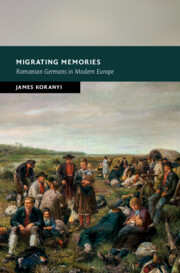Book contents
- Migrating Memories
- New Studies In European History
- Migrating Memories
- Copyright page
- Dedication
- Contents
- Figures
- Acknowledgements
- Note on the Text
- Introduction Stories, Identities, Memories
- Chapter 1 Making Romanian Germans
- Chapter 2 Transnational Germans
- Chapter 3 Fascist Divisions in the Romanian German Past
- Chapter 4 The Iron Memory Curtain: Romanian Germans and Communism
- Chapter 5 European Bridge-Builders: Romanian Germans after 1989
- Epilogue The Perpetual Exodus
- Bibliography
- Index
Chapter 2 - Transnational Germans
Published online by Cambridge University Press: 09 December 2021
- Migrating Memories
- New Studies In European History
- Migrating Memories
- Copyright page
- Dedication
- Contents
- Figures
- Acknowledgements
- Note on the Text
- Introduction Stories, Identities, Memories
- Chapter 1 Making Romanian Germans
- Chapter 2 Transnational Germans
- Chapter 3 Fascist Divisions in the Romanian German Past
- Chapter 4 The Iron Memory Curtain: Romanian Germans and Communism
- Chapter 5 European Bridge-Builders: Romanian Germans after 1989
- Epilogue The Perpetual Exodus
- Bibliography
- Index
Summary
After 1945, Romanian Germans explored multiple possibilities in their search to define a Heimat, taking us beyond the known narrative of the ‘other homeland’ in Germany. Their most hotly contested issue – where did they belong? – turned particularly acute during the Cold War, as the Romanian German community became more fractured and physically separated. Romanian German identity in this period, this chapter argues, was flexible and far more transnationally defined than often assumed. At its heart were opposing views of ‘regionalism’, nationalism, and belonging. Romanian German identity debates during this period operated on different scales in the community, which made identity contestation particularly messy. If the Landsmannschaften (homeland societies) in Germany encouraged greater emigration from Romania, other Romanian Germans, especially those close to the Lutheran Church, pushed back. Meanwhile, as this chapter demonstrates, the realities ‘on the ground’ reveal a rich cultural history of transnational Romanian Germans communicating across numerous borders, constantly rethinking their own roles in an uncertain Cold War.
Keywords
- Type
- Chapter
- Information
- Migrating MemoriesRomanian Germans in Modern Europe, pp. 63 - 114Publisher: Cambridge University PressPrint publication year: 2021

